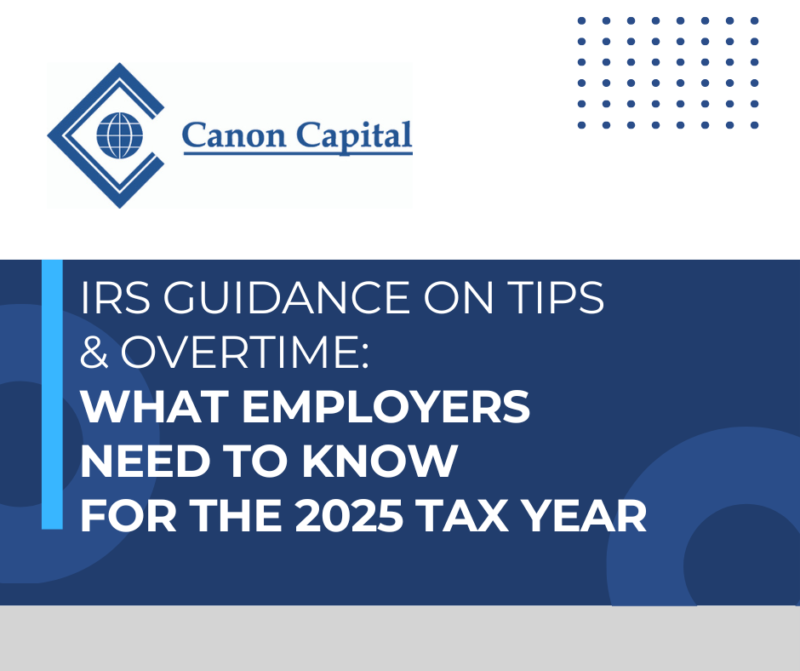Archives: Posts
Best Practices for Handling 1099 Contractors in 2026: How Canon Capital Payroll Service Reduces Your Risk
For many businesses, independent contractors remain an important part of the workforce. As we move into 2026, the rules themselves aren’t brand new but enforcement, reporting expectations, and misconceptions continue to trip up otherwise well-run companies. That’s where a strong payroll partner can make a meaningful difference.
When payroll is involved early and consistently, contractor compliance becomes a managed process rather than a year-end scramble.
Misclassification is still the biggest risk
Federal agencies continue to pay close attention to worker misclassification because it directly impacts payroll taxes, wage laws, and benefits eligibility. While business owners may think of classification as a legal or HR issue, payroll often sits at the center of the practical realities: how workers are paid, how often, and under what conditions.
From the payroll side, our role is to help clients pause before defaulting to a 1099 designation. We look at factors such as behavioral control, financial independence, and the overall nature of the working relationship. While payroll providers don’t “decide” classification in isolation, we help surface red flags early, before they become IRS or Department of Labor problems.
Threshold changes don’t eliminate responsibility
One notable change affecting 2026 reporting is the increased dollar threshold for certain 1099 filings, which rose from $600 to $2,000 for payments made after 2025. While that may reduce the number of forms issued, it does not reduce the importance of tracking contractor payments accurately throughout the year.
This is where payroll support matters. Even if a contractor ultimately falls below the reporting threshold, businesses still need proper documentation on file, including a completed W-9, accurate tax identification details, and clear payment categorization. Payroll systems are designed to track this information consistently, rather than relying on spreadsheets or memory in January.
Clearing up common misconceptions
Even in 2026, we continue to see a few persistent misunderstandings:
- “Payroll only handles employees.” In reality, our payroll teams manage contractor payments, W-9 collection, and year-end reporting.
- “If my bookkeeper paid them, payroll doesn’t need to know.” Fragmented systems increase risk. Contractor payments should be visible and coordinated across accounting and payroll.
- “1099s are just a form we file at year-end.” By the time January arrives, any missing W-9s or classification issues are already problems.
A proactive payroll approach
When payroll is integrated into contractor management, businesses benefit from standardized onboarding, cleaner records, and fewer surprises. Our goal is to handle as much of the administrative burden as possible, so business owners can focus on operations, not compliance anxiety.
If you’re entering 2026 with a growing mix of employees and contractors, now is the right time to review how payroll supports that structure. A small adjustment today can prevent costly corrections later.
64 Shoeboxes, One Shared Purpose
Our team recently came together for our third annual Pack-a-Shoebox Party in support of Operation Christmas Child. What started as a simple goal turned into a meaningful team effort, resulting in 64 packed shoeboxes ready to be delivered to children around the world.
Each box was filled with carefully chosen items—from small toys to school and hygiene essentials—intended to bring comfort, joy, and a reminder that someone, somewhere, cares.
What makes this effort special isn’t just the number of boxes, but the spirit behind them. It’s a reflection of our team’s willingness to pause during a busy season and focus on something beyond our day-to-day work.
We’re proud to continue this annual tradition and grateful to everyone who helped make it happen. Together, small actions added up to something truly meaningful.
Elm Terrace Gardens Technical Support Request
The web based support form is no longer in use. Please use the green IT button on your Windows desktop or system tray to submit a support request. If you do not have the green IT button, please give us a call at 215-723-4881, extension 800, and we will be happy to assist you.
Computer Recycling Program
In an effort to support our environment, provide our customers with a cost-effective, easy way to dispose of their unused computer equipment and comply with local equipment disposal laws, we are announcing a new computer equipment recycling program. Here’s how it works:
At your request, we will recycle your used computer equipment for you. Computers will have their hard drives rendered inoperable (so that there is no possibility of anyone extracting data from them). We will then transport your equipment to a certified computer equipment recycling center for proper disposal.
To encourage as much participation in this program as possible, we are keeping the fee for this service to a minimum. To have your computers recycled, simply:
- Complete the form below, indicating the quantity of each item to be recycled
- Drop your equipment off at our office (along with this form), or give your equipment to one of our staff persons when they are at your office for another engagement
- We will send you an invoice for the service fee
Vicki Barnes
Director of Payroll Services
Vicki joined Canon Capital in August, 1999 and is responsible for overseeing the daily operations of Payroll Services. Vicki has an Associate’s Degree in Accounting from Montgomery County Community College and has earned the Certified Payroll Professional designation. She is a member of the national American Payroll Association as well the Lehigh Valley Chapter, where she served as Secretary from 2006-2013. Vicki resides in Sassamansville with her husband and son and enjoys crafts, reading, and kayaking in her free time.
IRS Guidance on Tips & Overtime: What Employers Need to Know for the 2025 Tax Year
The IRS and U.S. Department of the Treasury have released official guidance clarifying how tips and overtime compensation will be treated for tax year 2025. While the changes primarily impact individual tax returns, employers should understand what, if anything, changes from a payroll perspective.
The Basics
Beginning in 2025, eligible individuals may claim:
- A Qualified Tips Deduction of up to $25,000
- A Qualified Overtime Deduction of up to $12,500 (for overtime pay above an employee’s regular rate)
These deductions are claimed by employees when they file their personal tax returns. They do not change how payroll is processed.
What Employers Need to Know
- No new payroll reporting requirements for 2025
- No changes to W-2 or withholding rules for tips or overtime this year
- Employers are not required to separately track or report “qualified” tips or overtime in 2025
Employees will determine eligibility and calculate these deductions when they file their individual returns using IRS guidance and their pay records.
What This Doesn’t Change
- Gross wages are still taxable and reportable as usual
- Employers must continue to withhold and remit payroll taxes on tips and overtime
- Overtime calculations, tip reporting, and payroll compliance rules remain the same
Looking Ahead
The IRS has indicated that updated reporting requirements may apply in future tax years, possibly starting in 2026. We’re monitoring developments closely and will communicate any changes that impact payroll processing.
How We’re Supporting You
As your payroll partner, we’ll continue to ensure your payroll is processed accurately and in compliance while keeping you informed of regulatory changes that affect your business and your employees.
As always, please contact us with any questions.
Services: Let’s Get Started
Accounting
Our team of certified public accountants, certified management accountants, and chartered global management accountants work with you to understand your goals – personal and business.
Payroll
You didn’t start a business to run a payroll company. We stay up-to-date on the latest tax rates and payroll practices so you don’t have to. Our efficient, cost-effective payroll services allow you to continue working on your business goals.
Wealth Management
- Learn more about wealth management, retirement planning, and 401(k) plan services here
Technologies
We take the worry out of your computer system management. From cyber threat management to data back-up, we work with you to address your concerns and make sure your systems are working for you.
Canon Capital Technical Support Request
The web based support form is no longer in use. Please use the green IT button on your Windows desktop or system tray to submit a support request. If you do not have the green IT button, please give us a call at 215-723-4881, extension 800, and we will be happy to assist you.
Lori E. Benner
Manager
Lori began working at Canon Capital in September 2022, bringing over 30 years of experience in corporate and partnership tax preparation and financial statement review. Lori earned her BS in Business Administration from Kutztown University and is a member of PSTAP (Pennsylvania Society of Tax and Accounting Professionals). A Perkasie resident, she relaxes by paddleboarding, doing yoga, baking, gardening, and hiking. Lori also enjoys spending time with her son, Collin, and her two mini Goldendoodles, Reilly and Chewie.






